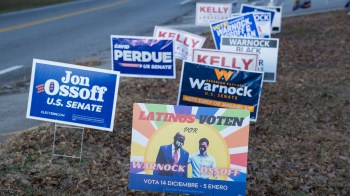She’s a veteran of charities’ pleas
TEXT OF STORY
Tess Vigeland: Since 9/11, a lot more charities have sprung up that claim to help veterans. Americans give more than a million dollars a day to these groups.
But some give as little as one penny per dollar donated to service members. Marketplace’s Nancy Marshall Genzer has our story.
Nancy Marshall Genzer: Sitting in her cozy home in Reading, Pa., Yvonne Oppenheimer rifles through a large cardboard box stuffed with solicitations from various veterans charities.
Yvonne Oppenheimer: And I would say there’s probably 20, 30 letters. And this is just in the last month.
The letters are addressed to her brother Gerard Frey. He died more than a year ago. His mail is forwarded to Oppenheimer. She says her brother donated to veterans charities for decades.
Oppenheimer: They knew they had him.
Oppenheimer says her brother was a veteran.
Oppenheimer: He was the kind of person that anything that came in with an American flag, the word veteran — that was it. He wrote out a check.
Lots of other people write checks to veterans charities, too. Patrick Rooney is with the Center on Philanthropy at Indiana University.
Patrick Rooney: Almost everybody, regardless of ideology and politics, feels sorry for a veteran who comes back wounded. And so it’s an easy case to make for philanthropic support.
Easy and profitable. Charities have to register in some states. And states attorneys general investigate scams. But no law says charities have to give away a certain percentage of their money. They do have to fill out an IRS form stating how much cash they raised, and how much they spent on charitable activities. But they don’t have to disclose that in their fund-raising appeals. As chairman of the House Committee on Oversight and Government Reform, Congressman Henry Waxman held hearings on veterans charities. The California Democrat left the committee, but his successor will continue his investigation. Waxman says sometimes donations wind up in the pockets of a charity’s executives.
Henry Waxman: People need to be aware that there are organizations that are out to get their money and not really do what they claim to do.
The most efficient veterans charities devote two-thirds of contributions to vets. But some give away just a quarter of their donations.
Roger Chapin runs several veterans charities. He didn’t respond to requests for an interview. But he did testify at one of Waxman’s hearings. Chapin’s charities raised more than $168 million from 2004 to 2006.
Chapin was asked why, in some cases, only 25 cents of every dollar his charities collect goes to veterans. He said it takes money to raise money. And he said he’d be out of business if his fund-raising appeals had to spell out how little goes to veterans.
Roger Chapin: If we disclose, which I am more than happy to do, we’ll all be out of business. Nobody would donate. It would dry up.
Chapin didn’t elicit much sympathy. But other charities say disclosure of raw numbers can be misleading. They can have legitimate reasons for not giving away most of their money in a given year.
Kathleen Burke is director of development for the National Military Family Association.
Kathleen Burke: You have to invest in infrastructure, management, and other things. You can’t always be spending everything all the time on programs, necessarily. It would be detrimental over the long term.
Burke says some charities save up money for years. Say, for a college scholarship for a one-year-old whose father was killed while serving in Iraq. Congress is struggling with how to protect donors, without hurting legitimate charities.
Lawmakers say the short-term answer is for donors to do some research. Independent charity watchdogs provide information on overhead expenses. Some have links to the charities’ IRS forms on their websites.
Back in Reading, Yvonne Oppenheimer says her brother never investigated the charities he contributed to. Some people don’t have the energy or time to check out a charity. Oppenheimer’s brother was still giving money away, even as he was dying.
Oppenheimer says, at the very least, the federal government should funnel more money to states attorneys general, who are the front-line investigators of charities.
Oppenheimer: We have to have watchdogs. The public can’t do it all.
Oppenheimer says a government watchdog could have helped prevent her brother from giving hundreds of thousands of dollars to un-vetted charities.
In Washington, I’m Nancy Marshall Genzer for Marketplace Money.
There’s a lot happening in the world. Through it all, Marketplace is here for you.
You rely on Marketplace to break down the world’s events and tell you how it affects you in a fact-based, approachable way. We rely on your financial support to keep making that possible.
Your donation today powers the independent journalism that you rely on. For just $5/month, you can help sustain Marketplace so we can keep reporting on the things that matter to you.


















